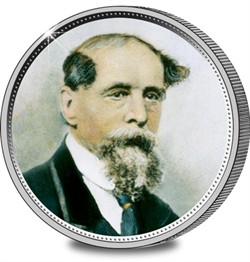
 |
Full name: Charles Dickens
Born: 7th February 1812
Place of Birth: Southsea, Portsmouth
Occupation: Author
Died: 9th June 1870
|
Charles John Huffam Dickens was born on 7th February 1812 in
Southsea, Portsmouth and was one of eight children. Dickens
early life was troubled due to his father's imprisonment for bad
debt, after the family moved from Portsmouth to Camden Town in
London. Dickens had to be taken out of school and endure poor
conditions whilst working at Warren's blacking factory along the
bank of the River Thames in London to support his family.
After his father received some inheritance money to pay off his
debts, Dickens was able to return to school but was forced out of
school again at the age of 15 and worked in an office to support
his family, which was the start of his long writing career.
Dickens fictionalised his troubled childhood experiences in two of
his most famous novels 'David Copperfield' and 'Great
Expectations'.
Charles Dickens began his writing career as a freelance reporter
for the law courts of London before becoming a journalist for 'The
Mirror of Parliament', 'The True Sun' and 'The Morning
Chronicle'. In 1836, Dickens published 'Sketches by Boz' and
began writing the famous series of monthly sketches called 'The
Posthumous Papers of the Pickwick Club'.
Dickens began writing his first novel 'Oliver Twist' whilst
working for a magazine called 'Bentley's Miscellany', which was
inspired by his own difficult childhood. Oliver Twist was
published in monthly instalments in a magazine and was hugely
successful in England and America. As a result, Dickens'
embarked on a tour of America to give lectures and speeches.
Dickens married Catherine Hogarth, with whom he had ten children,
but the couple separated in 1858. Dickens' literary career
consisted of the publication of a number of highly successful
novels. Dickens wrote one of his most famous publications, 'A
Christmas Carol' in 1843, followed by an autobiographical novel,
'David Copperfield' in 1850 and Bleak House in 1853 to name a
few. Dickens also wrote weekly periodicals, various travel
books and a number of plays and appeared in various theatre
productions, including a performance in front of Queen Victoria in
1851.
Charles Dickens' novels are still read and enjoyed today and he
is highly regarded as the greatest novelist of the Victorian
period. Dickens died on 9th June 1870 from a stroke and was
buried at Westminster Abbey.